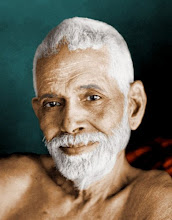Today, Eknath Easwaran tells us that if the spiritually gifted Saint Teresa of Avila “went through twenty years of doubt and struggle before becoming established in God,” we can hardly expect to do it in less time. Easwaran appears to be trying to motivate us to keep plugging away on our spiritual path with the understanding that it can’t deliver instant enlightenment but will amply reward us if we hang in there long enough.
However, I’m afraid that I find Easwaran’s attempt at encouragement to be something less than encouraging. For what of those of us who probably don’t have decades to devote to a spiritual path and who almost certainly lack Saint Teresa’s innate giftedness? What hope do WE have of “becoming established in God”? And if our chances are little to none, why should we even bother with any kind of spiritual path?
I raised this issue in a previous entry, and ebuddha addressed it in his blog by arguing that the goal is not so much the destination as the journey. That is, one can enjoy the pleasures and fruits, however modest, of the spiritual path in much the same way that one can enjoy the benefits of swimming, running, or working out with weights without needing or being able to become an Olympic champion swimmer, runner, or weightlifter.
I think ebuddha makes a good point. Even though I don’t play guitar because I know that I’ll never come close to achieving the astonishing technical mastery of my favorite players John McLaughlin and Allan Holdsworth, I do still bowl and enjoy bowling even though I’ll never be another Earl Anthony or Walter Ray Williams, and I do still write and enjoy writing even though I’ll never be another Alan Watts or Eknath Easwaran. So, why shouldn’t I also adhere to a spiritual or integral path even if I could never become another Ramana Maharshi or Saint Teresa? Couldn’t my life still be enriched by a consistent practice the way ebuddha says his is?
I’m not sure bowling and writing are all that analogous to spiritual practice. I can bowl and feel instant rewards in the forms of exercise, enjoyment, competition, and even winning money that I’m much more hard pressed to experience meditating. When I write, I also have an immediate sense of accomplishment in the forms of crystallizing my thoughts and feelings and sharing them with others that exceeds anything I experience when meditating or repeating my mantram. I can’t help but wonder if, despite the admonitions of sages like Ken Wilber that we need to practice, practice, practice, I’d be better off using the untold hours I’d otherwise spend meditating to read, think, and write.
Yet if I like to read, think, and write about spirituality and enlightened living, how can I hope to do a credible job of it unless I actually practice the disciplines that ground my words in the genuine wisdom of actually knowing firsthand whereof I speak instead of merely spouting untested speculations or parroting other people’s words? But if I legitimately doubt that I have the talent and the time remaining to become enlightened, why should I bother with a spiritual path when I could be using that incalculably precious time to bowl, read, think, write, learn another language, work out with weights, or study the guitar? I feel as though I have little enough time to do all the things I want to do now, and when I finally start working full time, I will have almost no time for anything but working, eating, and sleeping. So why spend thirty minutes or more a day meditating and engaging in other so-called spiritual practices that seem to yield no tangibly positive results, when I could be doing something else that does? And if I don’t feel qualified to write about things I don’t know firsthand, then why not write about things I do?



No comments:
Post a Comment